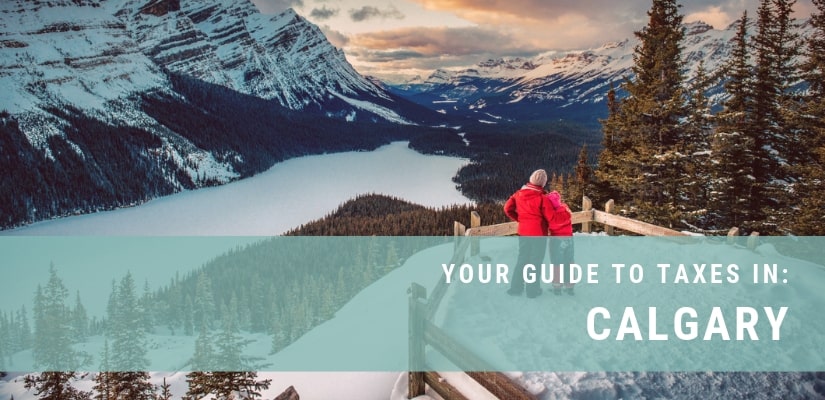
The tax rates in Canada are progressive, so the more you earn, the more tax you pay.
If you’re earning an income in Canada, you’ll need to pay tax on that income providing it is over the Canadian tax-free threshold of $14,398 in 2022.
TABLE OF CONTENTS
As well as federal tax, you’ll also need to pay Alberta provincial tax in Calgary. You can see the tax rates for 2022 in more details below.
2022 Federal Tax Rates
| Taxable Income 2022 Tax Brackets | Federal Tax Rate |
|---|---|
| On the first $50,197 of taxable income | 15% |
| From $50,197.01 up to $100,392 | 20.5% |
| From $100,392.01 up to $155,625 | 26% |
| From $155,625.01 up to $221,708 | 29% |
| Over $221,708 | 33% |
2022 Provincial Tax Rates
| Taxable Income 2022 | Alberta Tax Rate 2022 |
|---|---|
| First $131,220 | 10% |
| Up to $157,464 | 12% |
| Up to $209,952 | 13% |
| Up to $314,928 | 14% |
| Over $314,929 | 15% |
The basic personal amount in Alberta in 2022 is $19,369, so your taxable income is reduced by that amount.
What’s my SIN?
You can’t legally work in Canada without a Social Insurance Number (SIN).
Canadian government agencies use this number to identify you and you will need it in order to pay taxes, or access government programs and benefits.
You should provide your SIN to your new employer when you start a job.
What Canadian tax forms do I need to complete?
When you start a job in Canada, you’ll need to fill in federal and provincial personal tax credit forms so your employer knows how much tax to withhold from your wages.
A TD1 is a federal, provincial and personal tax credit form used to determine how much tax you should pay on your income.
There are a number of times when you may need to complete a TD1 form:
- when you have a new employer
- if you want to change credit amounts from previous years
- if you want to claim the deduction for living in a prescribed zone
- if you want to increase the amount of tax deducted at source
Have a look at the (2022) forms
TD1 Federal (2022)
TD1AB – Alberta (2022)
What is the 90% rule?
In short, if you earn 90% of your income in Canada during the tax year, you will be entitled to claim personal tax credits.
If this is not the case for you, then you should not claim the credits on the federal and provincial TD1 forms as you may end up with an underpayment of tax.
If more than 10% of your income was earned outside Canada, then you should make sure you enter 0 in box 13.
As a non-resident you won’t be taxed on your worldwide income in Canada. However, the Canada Revenue Agency requires you can avail of personal tax credits.
What’s my T4?
Your T4 is typically issued in February after the end of the tax year.
This document is a summary of the income that you earned and the tax that you paid in a particular tax year.
If you work in multiple jobs in Canada you will receive multiple T4 slips.
You can also use a T4 to apply for a tax refund!
How much you can claim depends on a number of factors, including:
- Your residency status
- How long you worked for
- How many jobs you had
- Income you received from overseas
- How much tax you paid
- If a tax treaty is applicable
How do I file my Canadian tax return?
Every taxpayer in Canada, including those on temporary visas (such as a working holiday visa), are legally obliged to file a tax return where they have had to pay tax for the year.
The deadline for filing your tax return is 30 April 2022 and it marks the end of the tax year – although you can choose to file from around mid-February.
It’s a good idea to file as early as possible to avoid the ‘deadline rush’.
Filing a tax return is the only way you can claim your tax back.
You can always file your tax return directly with the Canadian tax authorities or if that sounds like a whole lot of hassle, you can head over to Taxback.com. Their team of tax experts will take care of everything! In fact, they even offer a document retrieval service in case you can’t get a hold of your past payslips or your T4!
You May Also Like:
Accommodation in Calgary
Jobs in Calgary
Residency Status
You have to determine your Canadian residency before you file your tax return.
There are a number of factors to consider when determining your residency status, including:
- residential ties you have in Canada
- purpose and permanence of your stays abroad
- your ties abroad
However, in short, if you’re on a 1 or 2 year Working Holiday Visa, then you should probably file as a non-resident for tax purposes.
This can be a bit confusing.
However, if you have any questions don’t hesitate to contact Taxback.com who offer a 24/7 Live Chat service where a member of their team will be more than happy to answer any of your tax-related questions.
Wondering if you’re due a Tax Refund?
You are entitled to claim tax back if you have overpaid on your tax bill.
Overpayments of tax in Canada can be broken into 3 categories:
- Overpayment of income tax
- Overpayment of Canadian Pension Plan (CPP)
- Overpayment of Employer Insurance (EI)
You can use our partner Taxback.com’s online calculator to check if you’re due any tax back.
Want to claim a tax refund?
*Updated On April 6, 2022

